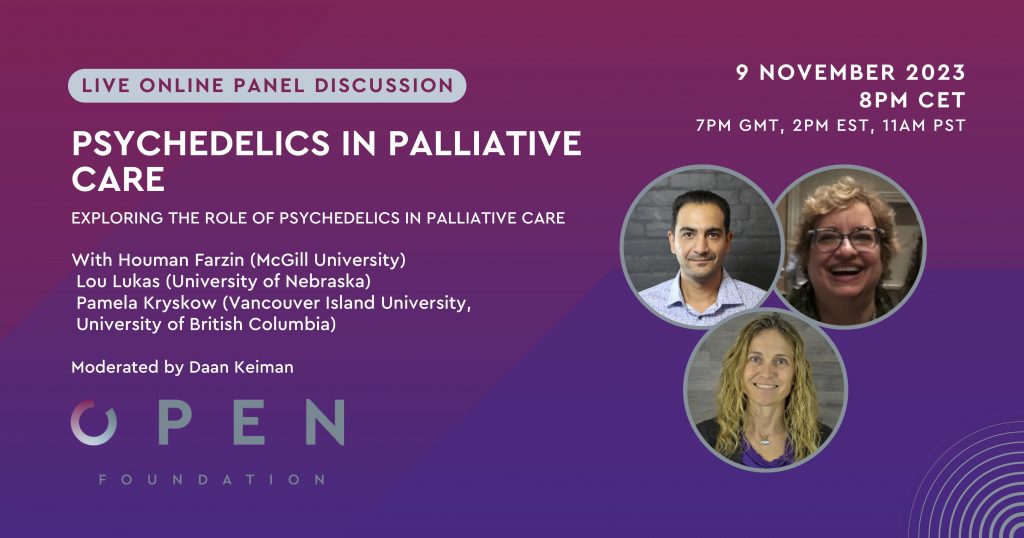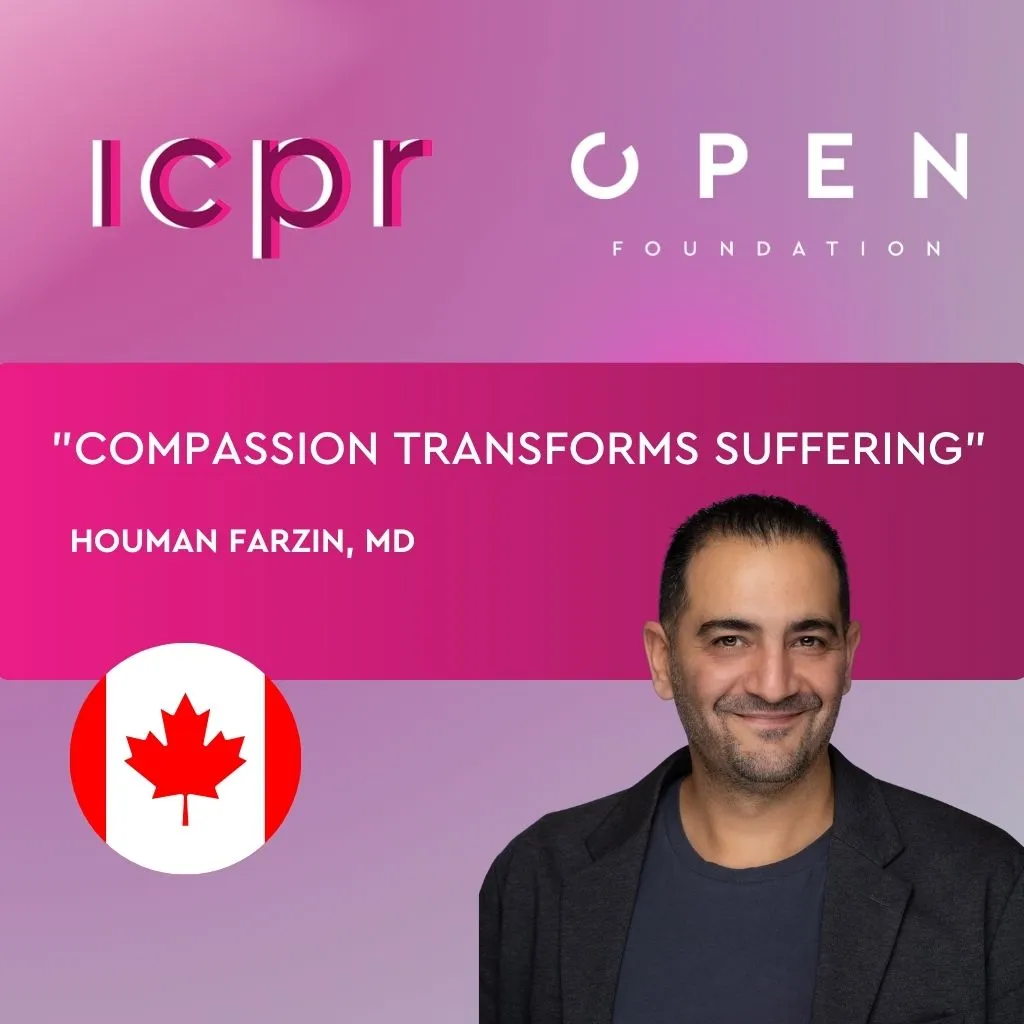Introduction to Psychedelic-Assisted Therapy in Palliative Care
Psychedelic-assisted therapy is emerging as a transformative approach in palliative care, offering new hope for patients facing the profound challenges of advanced cancer and end-of-life distress. In his presentation at the ICPR 2024, Dr. Houman Farzin, MD, a palliative care physician and clinical faculty member at McGill University, provided insights into the evolving field of psychedelic therapy, specifically focusing on its application in advanced cancer care. Drawing from real-world case studies in Montreal, Canada, Dr. Farzin highlighted the therapeutic potential of psilocybin and MDMA in alleviating physical and psychological suffering, offering a compelling vision for the future of palliative care.
about Dr. Houman Farzin: Pioneer in Psychedelic-Assisted Therapy and Palliative Care
Dr. Houman Farzin, M.D. is a leading physician specializing in psychedelic-assisted therapies, nutrition, and lifestyle modification to address trauma, existential distress, and enhance overall well-being. As an attending physician in the Division of Palliative Care at the Jewish General Hospital in Montreal, Dr. Farzin integrates emerging treatments and digital health technologies with mindfulness, music, and psychedelic medicine to improve quality of life and alleviate suffering across all life stages.
A lecturer at McGill University Medical School, Dr. Farzin also contributes to the McGill Programs in Whole Person Care, where he teaches resilience and Mindful Medical Practice to future physicians. His extensive training includes expertise in MDMA, psilocybin, and ketamine therapies, and he has been instrumental in organizing Quebec’s first psilocybin therapy training programs.
Dr. Farzin’s research focuses on the societal views of psilocybin therapy for existential distress and innovative treatments for chemotherapy-induced peripheral neuropathy. His contributions to the field are further exemplified by his role as a site physician for MAPPUSX, a study on MDMA-assisted psychotherapy for PTSD. He is also a co-founder of injoy (formerly Phyla), a digital health tool utilizing AI to connect diet, lifestyle, and microbiome health.
Passionate about indigenous cultures and altered states of consciousness, Dr. Farzin’s work is deeply informed by Eastern philosophies and his anthropological studies of ancient practices. His commitment to advancing psychedelic therapies in mainstream healthcare continues to inspire confidence in their potential to transform palliative care and mental health treatment.
Case Studies: Real-World Applications of Psychedelic Therapy
Dr. Farzin’s presentation at ICPR 2024 was grounded in the real-world application of psychedelic therapies, illustrating their profound impact on patients with advanced cancer. His work highlights the effectiveness of individual and group therapy sessions, tailored to each patient’s unique needs.
Case 1: Floran’s Journey with Psilocybin Therapy
One of the most compelling cases involved a patient named Floran, who underwent psilocybin-assisted therapy as part of her treatment for advanced cancer. Her first session, which involved a five-gram dose of psilocybin mushrooms, was characterized by intense emotions and a confrontation with deep-seated fears. However, it also opened up new pathways to healing, as depicted in a drawing she created afterward, illustrating her experience of moving from darkness to vibrant colors.
Case 2: A Retired Nurse Finds Peace
Another case involved a retired nurse in her seventies, suffering from advanced cancer and severe anxiety. Despite her reliance on multiple medications, the psilocybin session had a profound impact, providing her with a sense of peace and acceptance that had eluded her for years. Months after the session, she reported a transformative change in her outlook on life, illustrating the long-term benefits of psychedelic therapy.
Case 3: Rediscovering Poetry Through Psychedelic Therapy
A younger cancer patient rediscovered her love for poetry during her psilocybin-assisted therapy. The experience allowed her to reconnect with her inner child, a part of herself suppressed due to the trauma of her illness. This reconnection empowered her to express her emotions and creativity in ways that had previously been inaccessible.
The Importance of Somatic Awareness and the Mind-Body Connection
A critical component of Dr. Farzin’s approach to psychedelic therapy is the emphasis on somatic awareness—the recognition and processing of emotions and trauma stored in the body. This concept, supported by experts like Dr. Gabor Maté, posits that trauma can manifest as physical ailments, including cancer and autoimmune diseases. In psychedelic therapy, patients explore these bodily sensations to access and resolve deep-seated emotional issues.
For instance, during a session, a patient might experience intense physical sensations, which are then explored as manifestations of underlying trauma. By addressing these sensations directly, patients often access emotions and memories that are not readily available in their normal state of consciousness. This process aids in the release of stored trauma and fosters a deeper understanding of the mind-body connection, crucial for holistic healing.
The Evolution of Psychedelic Therapy in Canada
Psychedelic-assisted therapy has a complex history, marked by periods of intense research interest followed by decades of legal and cultural suppression. In Canada, psilocybin, the active compound in magic mushrooms, was banned in 1974, closely following the United States’ regulatory actions. However, a significant shift occurred in 2020 when an advocacy campaign led by four terminally ill patients resulted in legal exemptions for psilocybin use under Section 56 of the Controlled Drugs and Substances Act.
This legal breakthrough marked the beginning of a new era in Canadian healthcare, enabling patients facing end-of-life distress to access psilocybin-assisted therapy. The initial exemptions allowed patients to source psilocybin from the black market, setting a precedent that has since expanded into the Special Access Program (SAP), allowing broader clinical use under regulated conditions.
Dr. Farzin’s involvement with TheraPsil, a Canadian nonprofit dedicated to advancing legal access to psilocybin therapy, underscores the collaborative effort required to integrate these treatments into mainstream healthcare. The inclusion of psilocybin and MDMA in the SAP represents a significant milestone, enabling healthcare practitioners to apply for the use of these substances on a case-by-case basis for patients who do not respond to conventional treatments.
Psypal, The First EU-Funded Multi-Site Clinical Study into Psychedelic-Assisted Therapy
The EU marked a significant step forward in integrating psychedelic-assisted therapies into mainstream palliative care practices as it granted Psypal, a multi-site clinical study into psychedelic-assisted therapy, over €6.5 million. PsyPal aims to study the use of psilocybin in treating psychological distress in patients with progressive, incurable illnesses requiring palliative care. It consists of a European consortium of 19 partners, including the OPEN Foundation learn more.
Ethical Considerations and the Future of Psychedelic Therapy in Palliative Care
While the benefits of psychedelic therapy are increasingly recognized, the field is not without its ethical challenges. Dr. Farzin addresses these concerns by acknowledging the complexities of offering these treatments to vulnerable populations. One primary ethical consideration is the potential for these therapies to alter a patient’s perception of their illness and treatment choices, particularly in the context of end-of-life care.
Some may argue that providing psilocybin or MDMA therapy to terminally ill patients could influence their decisions regarding medical aid in dying (MAID). However, as Dr. Farzin notes, the goal of psychedelic therapy is not to steer patients away from MAID but to offer them additional tools for coping with their illness. In some cases, patients may still choose MAID after undergoing psychedelic therapy, but with a greater sense of peace and acceptance.
Conclusion: A New Paradigm in Palliative Care
Dr. Houman Farzin’s work represents a significant step forward in integrating psychedelic therapies into mainstream healthcare, particularly in palliative care. His pioneering efforts in Canada demonstrate the profound impact these therapies can have on patients facing the challenges of advanced cancer and end-of-life distress. By combining rigorous scientific research with compassionate patient care, Dr. Farzin is helping to pave the way for a new paradigm in palliative care—one that embraces the transformative potential of psychedelics to heal the body, mind, and spirit.
As the field of psychedelic therapy continues to evolve, healthcare professionals, researchers, and policymakers must collaborate to ensure that these treatments are accessible, ethical, and grounded in the best available evidence. Through innovation and teamwork, the potential for psychedelics to revolutionize palliative care is immense, offering new hope and healing to those who need it most.
Access recording to “Psychedelics in palliative Care” online event

Members of the OPEN community platform have access to all previous online events organized by the OPEN Foundation.













